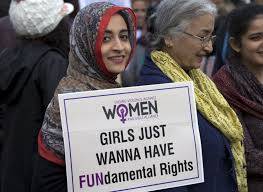
The word 'patriarchy' is widely used in mainstream narratives, not only by feminists but also by politicians, economists, entertainers, and a diverse group of professionals who may not necessarily identify themselves as feminists.
The conventional interpretation of this term often centers on male dominance. While hegemonic masculinities, misogyny, and sexism, in all their horrific details, have become easier to diagnose, identify, and consequently condemn by feminists of any wave, it remains a fact that women who are anti-women, non-feminists, or anti-feminists are becoming increasingly difficult to expose.
I am one of the foremost non-elite feminists and advocates of gender equality who attempted to demystify gender in Pakistani contexts through a number of initiatives, including my award-winning series, 'Gender Watch,' way back in 1999 on the relatively conservative and fully state-controlled PTV. It took me some time to recognize classism and deceit within feminist circles. In the earlier phase of my career, when I was still maintaining my academic pursuits alongside a visible tilt towards activism, the inclusion of the class factor in my lectures or talks also distanced me from mainstream, popular, powerful, and prestigious feminists and gender experts. This was long before calling oneself an intersectional feminist was either understandable or fashionable.
Even though I have always yearned to live in a utopia characterized by harmony, equality, and love, these ideals remain my perpetual dreams. With eyes wide open, I cannot ignore the insincerity in the meticulously cultivated and widely disseminated pseudo-sisterhood and #womensupportingwomen-type messages and mindsets, perpetuated by many well-trained and often well-funded individuals, both women and men alike.
Regrettably, skepticism surrounding certain prominent advocates for women and the politics of donor funds undermines the cause of women's empowerment and the principle of #empoweredwomenempowerothers. This emptiness becomes apparent when one simply observes the ineffectiveness of symbolic initiatives aimed at legal and economic empowerment for women in need, as well as the disappointing progress toward the specified indicators of the UN's Sustainable Development Goals for 2030. Unfortunately, the patriarchal consensus, reinforced by elitist consensus, makes it challenging for such criticism and critique not to be sidelined. As a result, the status quo prevails, and non-elite women continue to endure various forms of suffering, with one of the most egregious being their representation at domestic and global levels by the usual 'suspects' within the social development industry. The reality is that terms like Diversity, Equity, and Inclusion have also been reduced to mere tokens for hashtags, optics, photoshoots, and the like, much like the often-repeated slogan of 'leave no one behind.
As a survivor of multiple forms of violence at the family, community, professional, and state levels, I have never had any confusion about toxic masculinity among a significant majority of men, their ways of operating, and how and why they prefer certain women in both personal and professional spheres, often avoiding those who are outspoken, intelligent, and bold. However, in parallel, I have never doubted the presence of goodness among people, including men, and exceptions.
Simultaneously, I have observed how women can sabotage other women. I have personally experienced and witnessed women acting exactly like violent, scheming, and manipulative males in their roles as mothers, mothers-in-law, sisters-in-law, first wives, or second wives.
I have also witnessed thoroughly professional women in the media engaging in character assassination of other women, especially if they are vulnerable on multiple levels. Similarly, I have experienced personal bullying and abusive behavior at workplaces from women with the support of male friends, spouses, or relatives in positions of influence.
What does all this mean? There may not be any simpler or singular explanation. What I have understood is that both women and men, as well as individuals with any other gender identity, can exhibit patriarchal behavior and attitudes. This makes Patriarchy an ideology, an art, a craft, a skill set, a leadership style, or maybe a personality disorder rather than an all-masculine biological trait. Therefore, while celebrating the mobilization, involvement, inclusion, and belonging of women in any sphere of business, it must never be forgotten that women in relational roles or professional positions are not necessarily gender-sensitive and empathetic toward other women.
They may need training and coaching in these areas, just as most men do, who are gender-blind, insensitive, and equate their undue control with protection, patronization, or even love, and unwarranted favours toward women with specific criteria, thinking of it as feminism.

